
At the 1896 Summer Olympics, the first modern Olympiad, twelve athletics events were contested. A total of 25 medals were awarded. The medals were later denoted as 37 modern medals. All of the events except the marathon were held in the Panathinaiko Stadium, which was also the finish for the marathon. Events were held on 6 April, 7 April, 9 April, and 10 April 1896. Altogether, 63 athletes, all men, from nine nations competed. This made athletics the most international of the nine sports at the 1896 Games.

Allen Kenneth Johnson is an American former hurdling athlete who won the gold medal in the 110 metre hurdles at the 1996 Summer Olympics in Atlanta, Georgia. He is also a four-time world champion.
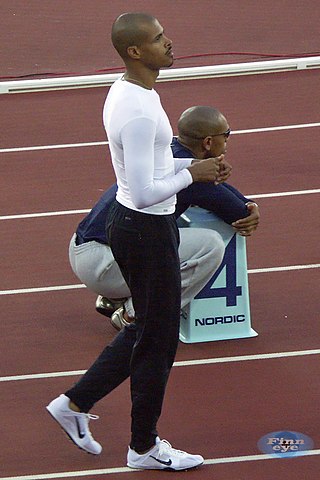
The men's 400 metres hurdles at the 2004 Summer Olympics as part of the athletics program were held at the Athens Olympic Stadium from August 23 to 26. There were 35 competitors from 24 nations. The event was won by Félix Sánchez of the Dominican Republic, the nation's first medal in the men's 400 metres hurdles. Silver went to Danny McFarlane of Jamaica, returning to the podium in the event for the first time since 1992. Naman Keïta's bronze was France's first medal in the event in over 100 years; the last Frenchman to medal in the long hurdles was Henri Tauzin in 1900. The United States' five-Games gold medal streak ended; for only the second time in the history of the event, Americans competed but won no medals.
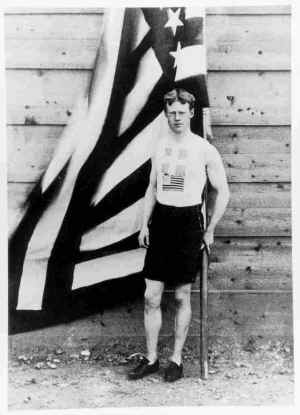
Thomas Pelham Curtis was an American athlete and the winner of the 110 metres hurdles at the 1896 Summer Olympics.
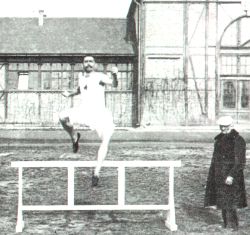
Alajos János Szokolyi was a Hungarian athlete, sports organizer, sports manager, archivist and physician.

Kurt Wilhelm Doerry was a German track and field athlete. He competed at the 1896 Summer Olympics in Athens and the 1900 Summer Olympics held in Paris.
William Welles Hoyt was an American track and field athlete. He competed at the 1896 Summer Olympics in Athens. He was born in Glastonbury, Connecticut.

Pierre Alexandre Tuffèri, also spelt Tuffère, was a French-Greek athlete, although he was born and lived in Athens, his father was French. He competed at the 1896 Summer Olympics and the 1900 Summer Olympics for France, and the 1906 Intercalated Games for Greece.
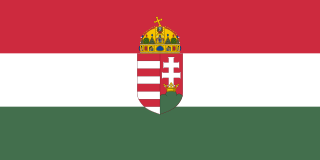
Hungary competed at the 1896 Summer Olympics in Athens, Greece. Austrian and Hungarian results at early Olympic Games are generally kept separate despite the union of the two nations as Austria-Hungary at the time.

The first heat of the men's 100 metres race was the first event run at the modern Olympics, on 6 April 1896. The event consisted of 3 heats and a final, held on 10 April. The 100 metres was the shortest race on the Athletics at the 1896 Summer Olympics programme. 15 athletes from 8 nations competed. The event was won by Thomas Burke of the United States. Fritz Hofmann of Germany took second, with Hungarian Alajos Szokolyi and American Francis Lane tying for third. These competitors are recognized as gold, silver, and bronze medalists by the International Olympic Committee, though that award system had not yet been implemented in 1896.

The men's 400 metres race was the second-shortest of the flat-track events on the Athletics at the 1896 Summer Olympics programme. The competition's preliminary round was the last held on the first day, 6 April. The competitors were split into two groups. The top two runners in each heat advanced to the final, which was held on the second day, 7 April.
The men's 1500 metres race, the longest flat-track race of the 1896 Summer Olympics programme, was the last event on 7 April. It was run in a single heat, with eight athletes competing.

The men's 110 metres hurdles was the only hurdling event on the Athletics at the 1896 Summer Olympics programme. The preliminary heats were the first track event of the day on 7 April. Eight competitors ran in two heats of four runners each. Only the fastest two runners in each heat advanced to the final. The event was won by Thomas Curtis of the United States.

The men's pole vault was one of four jumping events on the Athletics at the 1896 Summer Olympics programme. Five athletes competed in the pole vault. The two Americans far outclassed the three Greeks, starting higher than the Greeks could clear and taking first and second places. Damaskos and Theodoropoulos tied for third, while Xydas took fifth.

Andrew Steven Turner is an English bodybuilder and retired track and field athlete who specialised in the 110 metres hurdles and occasionally competed in the 100 and 200 metres sprints as well as long jump. At the 110 m hurdles, he is the 2011 World Championship bronze medallist, the 2010 European Champion and the 2010 Commonwealth Champion. Also in 2010, he broke the automatically timed world record in the 200 metres hurdles. He was coached by Lloyd Cowan.
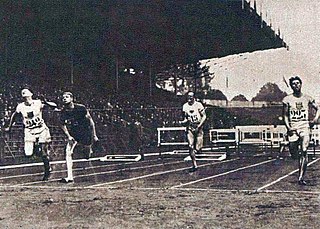
The men's 110 metres hurdles event was part of the track and field athletics programme at the 1924 Summer Olympics. The competition was held on Tuesday, July 8, 1924, and on Wednesday, July 9, 1924. Thirty-one hurdlers from 17 nations competed. The maximum number of athletes per nation was 4. The event was won by Daniel Kinsey of the United States, the nation's sixth victory in the seven times the event had been held. South Africa and Sweden each won their first 110 metres hurdles medals with Sydney Atkinson's silver and Sten Pettersson's bronze, respectively.

The men's 110 metres hurdles event at the 1928 Olympic Games took place between July 31 & August 1. Forty-one athletes from 24 nations competed. The maximum number of athletes per nation was 4. The event was won by Sydney Atkinson of South Africa, the nation's first title in the 110 metres hurdles; Atkinson became the first man to win two medals in the event. It was only the second time the United States had not won the event; as in 1920, the Americans took silver and bronze.

The men's 110 metres hurdles hurdling event at the 1932 Summer Olympics took place on August 2 and August 3 at the Los Angeles Memorial Coliseum. Seventeen athletes from 10 nations competed. The 1930 Olympic Congress in Berlin had reduced the limit from 4 athletes per NOC to 3 athletes. The event was won by George Saling of the United States, the first in a streak of nine victories by the Americans. It initially appeared that the Americans had swept the medals, but film review showed that Don Finlay had come in third over Jack Keller; this gave Great Britain its first medal in the event since 1896.
The First Olympics: Athens 1896 is a 1984 American television miniseries produced by Columbia Pictures Television for broadcast by the NBC network. This television miniseries tells the story of the founding of the modern Olympics by focusing on individuals in several countries and their preparations and eventual competition in Athens in 1896. The two-part mini-series originally aired in the United States on May 20 and 21, 1984.

The men's 110 metre hurdles at the 2004 Summer Olympics as part of the athletics program were held at the Athens Olympic Stadium from August 24 to 27. Forty-seven athletes from 34 nations competed. The event was won by Liu Xiang of China, the nation's first medal in the event. Terrence Trammell and Anier García became the 11th and 12th men to win multiple medals in the 110 metres hurdles.
















